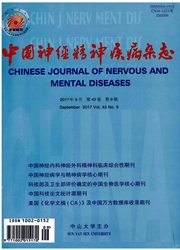

 中文摘要:
中文摘要:
目的:积极式个案管理模式(assertive case management,ACM)对社区精神分裂症患者疾病复发及卫生经济学指标的影响。方法200例社区精神分裂症患者随机分为研究组(入组107例,完成107例)和对照组(入组93例,完成91例),分别接受ACM干预及进行自然观察,随访12个月。采用临床总体印象量表(clinical global impressions scale,CGI)、卫生经济学指标每3个月评估一次,采用药物依从性量表(medication adherence rating scale,MARS)在基线、3、6、12个月时分别进行评估,家庭负担量表(family burden instructing,FBI)在干预前后评估。结果研究组复发率(1.9%)低于对照组(11.0%),差异有统计学意义(P<0.01)。经重复测量方差分析,CGI-SI的时间主效应有统计学意义(P<0.01)。MARS因子1、因子3的时间主效应和组间主效应均有统计学意义(均P<0.05),因子1的交互作用有统计学意义(P<0.01),研究组的因子1评分不同时间之间有统计学差异(P<0.01)。两组间接成本、总费用的时间主效应有统计学意义(均P<0.05),直接成本、总费用的交互效应有统计学意义(P<0.05),研究组直接成本、总费用不同时间之间有统计学差异(均P<0.05)。两组干预前后FBI各维度的差值比较,研究组干预后对家庭关系影响分较对照组下降更明显(P<0.01)。结论 ACM模式能减少社区精神分裂症的复发,改善服药依从性,改善对家庭关系影响,减少治疗成本。
 英文摘要:
英文摘要:
Objective To evaluate the effect of assertive case management on relapse and health economic evalua?tion in schizophrenics living in communities. Methods Two hundred outpatients were randomly divided into the study group (107 enrolled, 107 completed) which received assertive case management and the control group (93 enrolled, 91 completed) which received normal management treatment for 12 months. Clinical global impression scale (CGI) and the cost of treatment were assessed every three months. Medication adherence and family burden were evaluated before treat?ment and 3, 6 and 12 months after the treatment using Medication Adherence Rating Scale (MARS) and Family Burden Instructing, respectively. Results The study group was less likely to relapse compared with the control group over the 12-month follow-up and the relapse rates were 1.9%and 11.0%in study and control groups, respectively (P〈0.01). The repeated-measures analysis of variance indicated that time main effect was significant in severity of illness factor score of CGI (P〈0.01). The time main effect and group main effect in factor 1 and factor 3 scores of MARS were significant (all P〈0.05) and there was an interaction effect in factor1 score of MARS (P〈0.01). In the study group, time effect were signifi?cant in factor 1 score of MARS (P〈0.01). The time main effects in indirect cost and total cost were significant and so were interaction effects in direct cost and total cost (P〈0.05). In the study group, time effects were significant in direct cost and total cost (P〈0.01). Comparison of FBI dimensions before and after the intervention showed that family relation?ship was much more decreased in the study group than in the control group (P〈0.01). Conclusions Assertive Case Man?agement can reduce the recurrence of schizophrenia living in communities, improve compliance medication and family re?lationship as well as reduce the cost of treatment.
 同期刊论文项目
同期刊论文项目
 同项目期刊论文
同项目期刊论文
 Association Between BDNF Val66Met Polymorphism and Cognitive Performance in Antipsychotic-Na?ve Pati
Association Between BDNF Val66Met Polymorphism and Cognitive Performance in Antipsychotic-Na?ve Pati Exploring the pathogenetic association between schizophrenia and type 2 diabetes mellitus diseases b
Exploring the pathogenetic association between schizophrenia and type 2 diabetes mellitus diseases b 期刊信息
期刊信息
